BUMGT5920 - Managing in a Global Business Environment: Exam Solutions
VerifiedAdded on 2023/06/15
|5
|985
|227
Report
AI Summary
This report provides an analysis of management in a global business environment, focusing on cultural dimensions and management styles. It explores Hofstede's cultural dimensions, including Power Distance Index (PDI), Individualism versus Collectivism (IDV), Masculinity versus Femininity (MAS), Uncertainty Avoidance Index (UAI), Pragmatic versus Normative (PRA), and Indulgence versus Restraint (IVR). The report also addresses management problems faced by American and Japanese workers, highlighting differences in their approaches. Furthermore, it discusses strategic pre-dispositions in shaping cultural orientations, including ethnocentric, polycentric, regio-centric, and geocentric pre-dispositions. The report also touches upon valued theories for American managers in Europe, such as expectancy theory, goal setting theory, and equity theory, as well as the importance of the two-factor theory of motivation in Japan and British locations, emphasizing the significance of job content over hygiene factors.
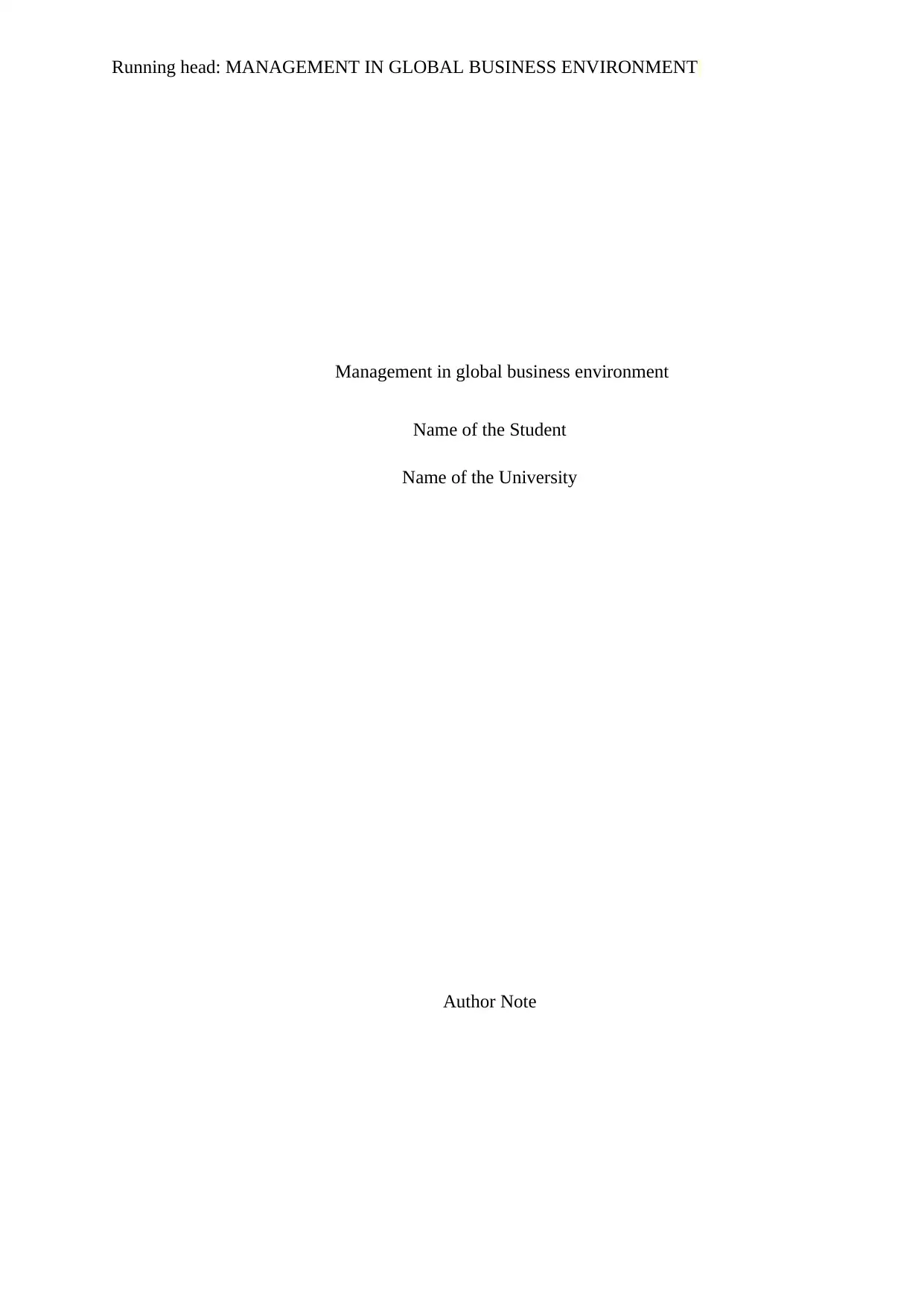
Running head: MANAGEMENT IN GLOBAL BUSINESS ENVIRONMENT
Management in global business environment
Name of the Student
Name of the University
Author Note
Management in global business environment
Name of the Student
Name of the University
Author Note
Paraphrase This Document
Need a fresh take? Get an instant paraphrase of this document with our AI Paraphraser
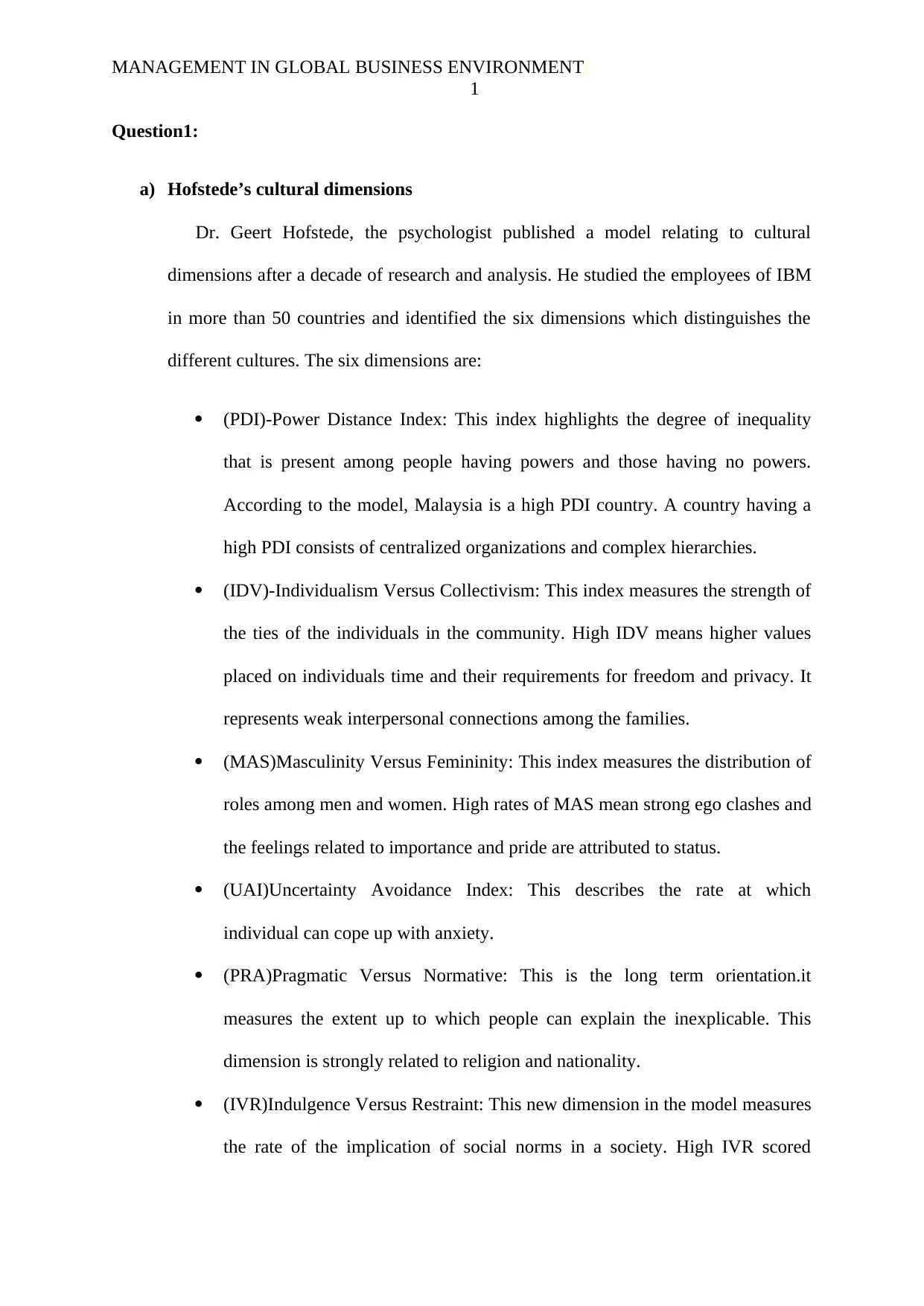
MANAGEMENT IN GLOBAL BUSINESS ENVIRONMENT
1
Question1:
a) Hofstede’s cultural dimensions
Dr. Geert Hofstede, the psychologist published a model relating to cultural
dimensions after a decade of research and analysis. He studied the employees of IBM
in more than 50 countries and identified the six dimensions which distinguishes the
different cultures. The six dimensions are:
(PDI)-Power Distance Index: This index highlights the degree of inequality
that is present among people having powers and those having no powers.
According to the model, Malaysia is a high PDI country. A country having a
high PDI consists of centralized organizations and complex hierarchies.
(IDV)-Individualism Versus Collectivism: This index measures the strength of
the ties of the individuals in the community. High IDV means higher values
placed on individuals time and their requirements for freedom and privacy. It
represents weak interpersonal connections among the families.
(MAS)Masculinity Versus Femininity: This index measures the distribution of
roles among men and women. High rates of MAS mean strong ego clashes and
the feelings related to importance and pride are attributed to status.
(UAI)Uncertainty Avoidance Index: This describes the rate at which
individual can cope up with anxiety.
(PRA)Pragmatic Versus Normative: This is the long term orientation.it
measures the extent up to which people can explain the inexplicable. This
dimension is strongly related to religion and nationality.
(IVR)Indulgence Versus Restraint: This new dimension in the model measures
the rate of the implication of social norms in a society. High IVR scored
1
Question1:
a) Hofstede’s cultural dimensions
Dr. Geert Hofstede, the psychologist published a model relating to cultural
dimensions after a decade of research and analysis. He studied the employees of IBM
in more than 50 countries and identified the six dimensions which distinguishes the
different cultures. The six dimensions are:
(PDI)-Power Distance Index: This index highlights the degree of inequality
that is present among people having powers and those having no powers.
According to the model, Malaysia is a high PDI country. A country having a
high PDI consists of centralized organizations and complex hierarchies.
(IDV)-Individualism Versus Collectivism: This index measures the strength of
the ties of the individuals in the community. High IDV means higher values
placed on individuals time and their requirements for freedom and privacy. It
represents weak interpersonal connections among the families.
(MAS)Masculinity Versus Femininity: This index measures the distribution of
roles among men and women. High rates of MAS mean strong ego clashes and
the feelings related to importance and pride are attributed to status.
(UAI)Uncertainty Avoidance Index: This describes the rate at which
individual can cope up with anxiety.
(PRA)Pragmatic Versus Normative: This is the long term orientation.it
measures the extent up to which people can explain the inexplicable. This
dimension is strongly related to religion and nationality.
(IVR)Indulgence Versus Restraint: This new dimension in the model measures
the rate of the implication of social norms in a society. High IVR scored
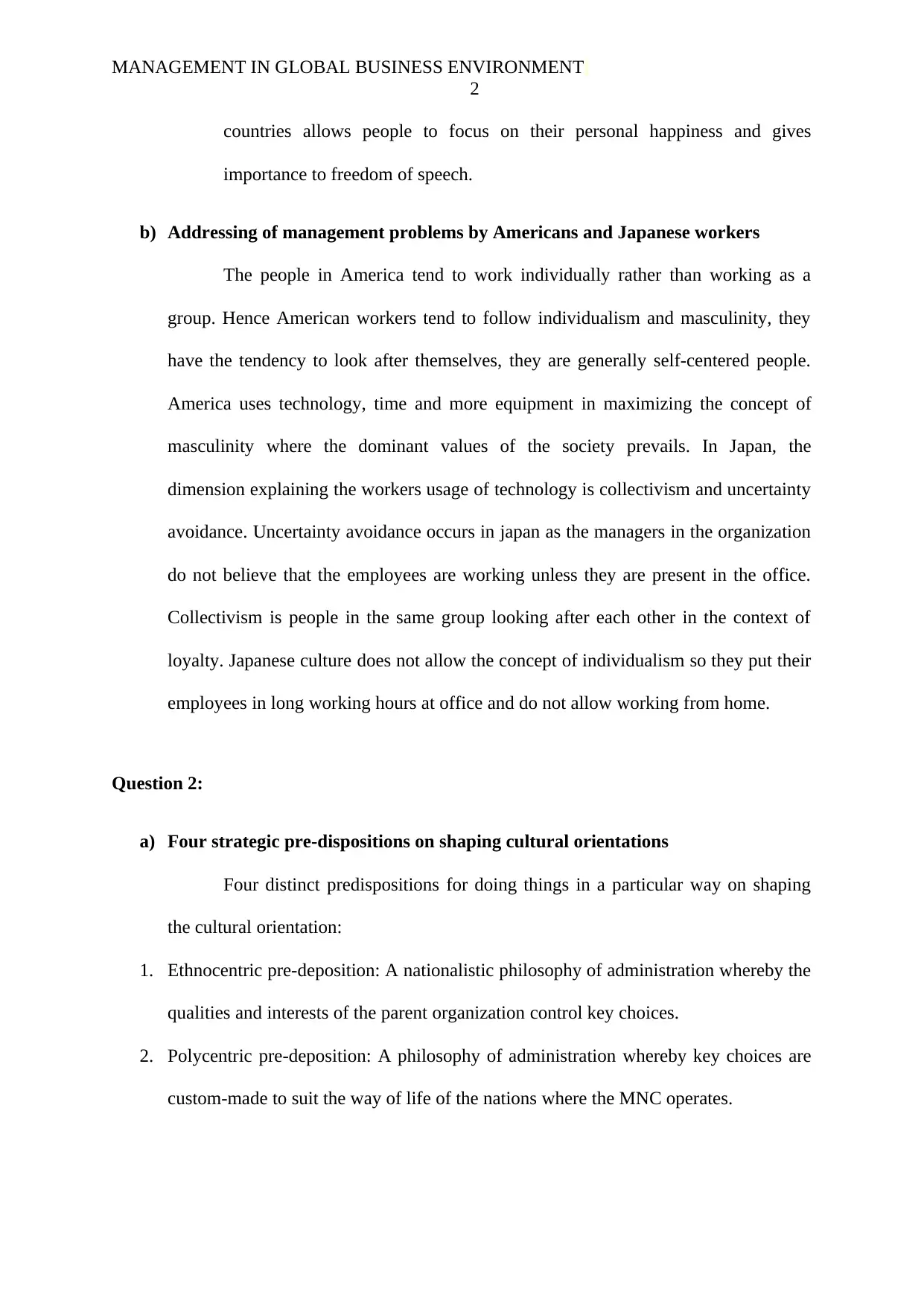
MANAGEMENT IN GLOBAL BUSINESS ENVIRONMENT
2
countries allows people to focus on their personal happiness and gives
importance to freedom of speech.
b) Addressing of management problems by Americans and Japanese workers
The people in America tend to work individually rather than working as a
group. Hence American workers tend to follow individualism and masculinity, they
have the tendency to look after themselves, they are generally self-centered people.
America uses technology, time and more equipment in maximizing the concept of
masculinity where the dominant values of the society prevails. In Japan, the
dimension explaining the workers usage of technology is collectivism and uncertainty
avoidance. Uncertainty avoidance occurs in japan as the managers in the organization
do not believe that the employees are working unless they are present in the office.
Collectivism is people in the same group looking after each other in the context of
loyalty. Japanese culture does not allow the concept of individualism so they put their
employees in long working hours at office and do not allow working from home.
Question 2:
a) Four strategic pre-dispositions on shaping cultural orientations
Four distinct predispositions for doing things in a particular way on shaping
the cultural orientation:
1. Ethnocentric pre-deposition: A nationalistic philosophy of administration whereby the
qualities and interests of the parent organization control key choices.
2. Polycentric pre-deposition: A philosophy of administration whereby key choices are
custom-made to suit the way of life of the nations where the MNC operates.
2
countries allows people to focus on their personal happiness and gives
importance to freedom of speech.
b) Addressing of management problems by Americans and Japanese workers
The people in America tend to work individually rather than working as a
group. Hence American workers tend to follow individualism and masculinity, they
have the tendency to look after themselves, they are generally self-centered people.
America uses technology, time and more equipment in maximizing the concept of
masculinity where the dominant values of the society prevails. In Japan, the
dimension explaining the workers usage of technology is collectivism and uncertainty
avoidance. Uncertainty avoidance occurs in japan as the managers in the organization
do not believe that the employees are working unless they are present in the office.
Collectivism is people in the same group looking after each other in the context of
loyalty. Japanese culture does not allow the concept of individualism so they put their
employees in long working hours at office and do not allow working from home.
Question 2:
a) Four strategic pre-dispositions on shaping cultural orientations
Four distinct predispositions for doing things in a particular way on shaping
the cultural orientation:
1. Ethnocentric pre-deposition: A nationalistic philosophy of administration whereby the
qualities and interests of the parent organization control key choices.
2. Polycentric pre-deposition: A philosophy of administration whereby key choices are
custom-made to suit the way of life of the nations where the MNC operates.
⊘ This is a preview!⊘
Do you want full access?
Subscribe today to unlock all pages.

Trusted by 1+ million students worldwide
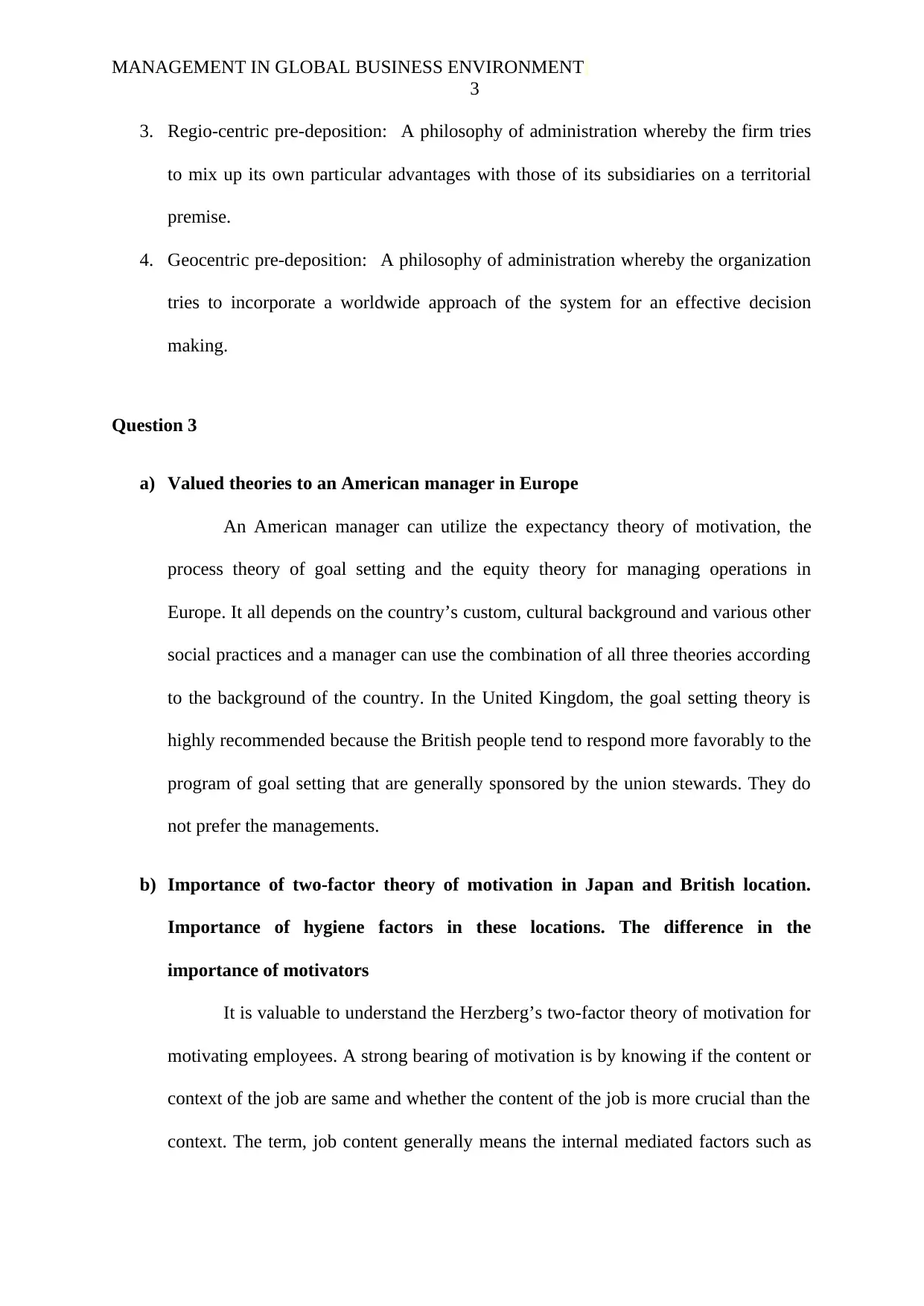
MANAGEMENT IN GLOBAL BUSINESS ENVIRONMENT
3
3. Regio-centric pre-deposition: A philosophy of administration whereby the firm tries
to mix up its own particular advantages with those of its subsidiaries on a territorial
premise.
4. Geocentric pre-deposition: A philosophy of administration whereby the organization
tries to incorporate a worldwide approach of the system for an effective decision
making.
Question 3
a) Valued theories to an American manager in Europe
An American manager can utilize the expectancy theory of motivation, the
process theory of goal setting and the equity theory for managing operations in
Europe. It all depends on the country’s custom, cultural background and various other
social practices and a manager can use the combination of all three theories according
to the background of the country. In the United Kingdom, the goal setting theory is
highly recommended because the British people tend to respond more favorably to the
program of goal setting that are generally sponsored by the union stewards. They do
not prefer the managements.
b) Importance of two-factor theory of motivation in Japan and British location.
Importance of hygiene factors in these locations. The difference in the
importance of motivators
It is valuable to understand the Herzberg’s two-factor theory of motivation for
motivating employees. A strong bearing of motivation is by knowing if the content or
context of the job are same and whether the content of the job is more crucial than the
context. The term, job content generally means the internal mediated factors such as
3
3. Regio-centric pre-deposition: A philosophy of administration whereby the firm tries
to mix up its own particular advantages with those of its subsidiaries on a territorial
premise.
4. Geocentric pre-deposition: A philosophy of administration whereby the organization
tries to incorporate a worldwide approach of the system for an effective decision
making.
Question 3
a) Valued theories to an American manager in Europe
An American manager can utilize the expectancy theory of motivation, the
process theory of goal setting and the equity theory for managing operations in
Europe. It all depends on the country’s custom, cultural background and various other
social practices and a manager can use the combination of all three theories according
to the background of the country. In the United Kingdom, the goal setting theory is
highly recommended because the British people tend to respond more favorably to the
program of goal setting that are generally sponsored by the union stewards. They do
not prefer the managements.
b) Importance of two-factor theory of motivation in Japan and British location.
Importance of hygiene factors in these locations. The difference in the
importance of motivators
It is valuable to understand the Herzberg’s two-factor theory of motivation for
motivating employees. A strong bearing of motivation is by knowing if the content or
context of the job are same and whether the content of the job is more crucial than the
context. The term, job content generally means the internal mediated factors such as
Paraphrase This Document
Need a fresh take? Get an instant paraphrase of this document with our AI Paraphraser
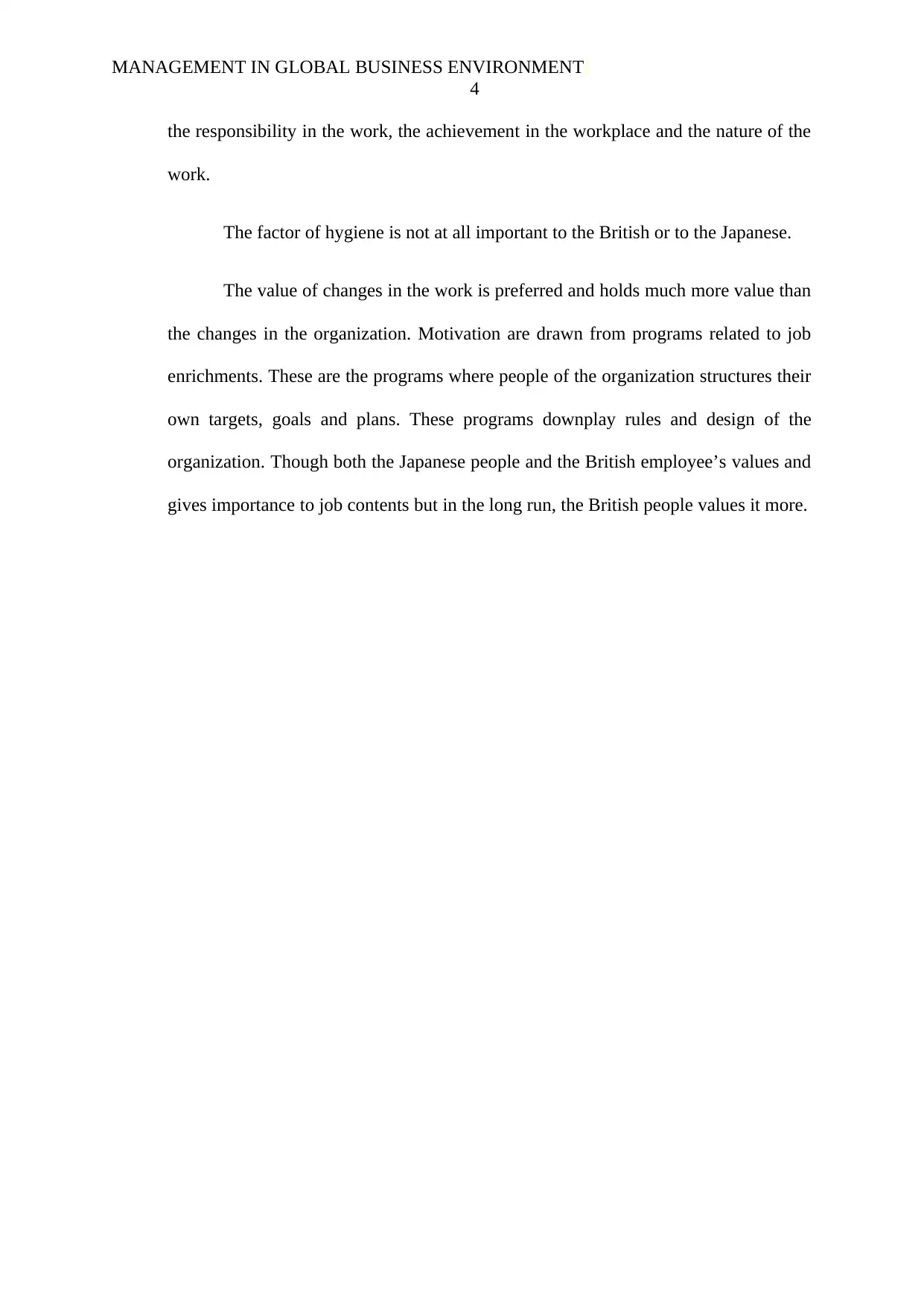
MANAGEMENT IN GLOBAL BUSINESS ENVIRONMENT
4
the responsibility in the work, the achievement in the workplace and the nature of the
work.
The factor of hygiene is not at all important to the British or to the Japanese.
The value of changes in the work is preferred and holds much more value than
the changes in the organization. Motivation are drawn from programs related to job
enrichments. These are the programs where people of the organization structures their
own targets, goals and plans. These programs downplay rules and design of the
organization. Though both the Japanese people and the British employee’s values and
gives importance to job contents but in the long run, the British people values it more.
4
the responsibility in the work, the achievement in the workplace and the nature of the
work.
The factor of hygiene is not at all important to the British or to the Japanese.
The value of changes in the work is preferred and holds much more value than
the changes in the organization. Motivation are drawn from programs related to job
enrichments. These are the programs where people of the organization structures their
own targets, goals and plans. These programs downplay rules and design of the
organization. Though both the Japanese people and the British employee’s values and
gives importance to job contents but in the long run, the British people values it more.
1 out of 5
Related Documents
Your All-in-One AI-Powered Toolkit for Academic Success.
+13062052269
info@desklib.com
Available 24*7 on WhatsApp / Email
![[object Object]](/_next/static/media/star-bottom.7253800d.svg)
Unlock your academic potential
Copyright © 2020–2025 A2Z Services. All Rights Reserved. Developed and managed by ZUCOL.




